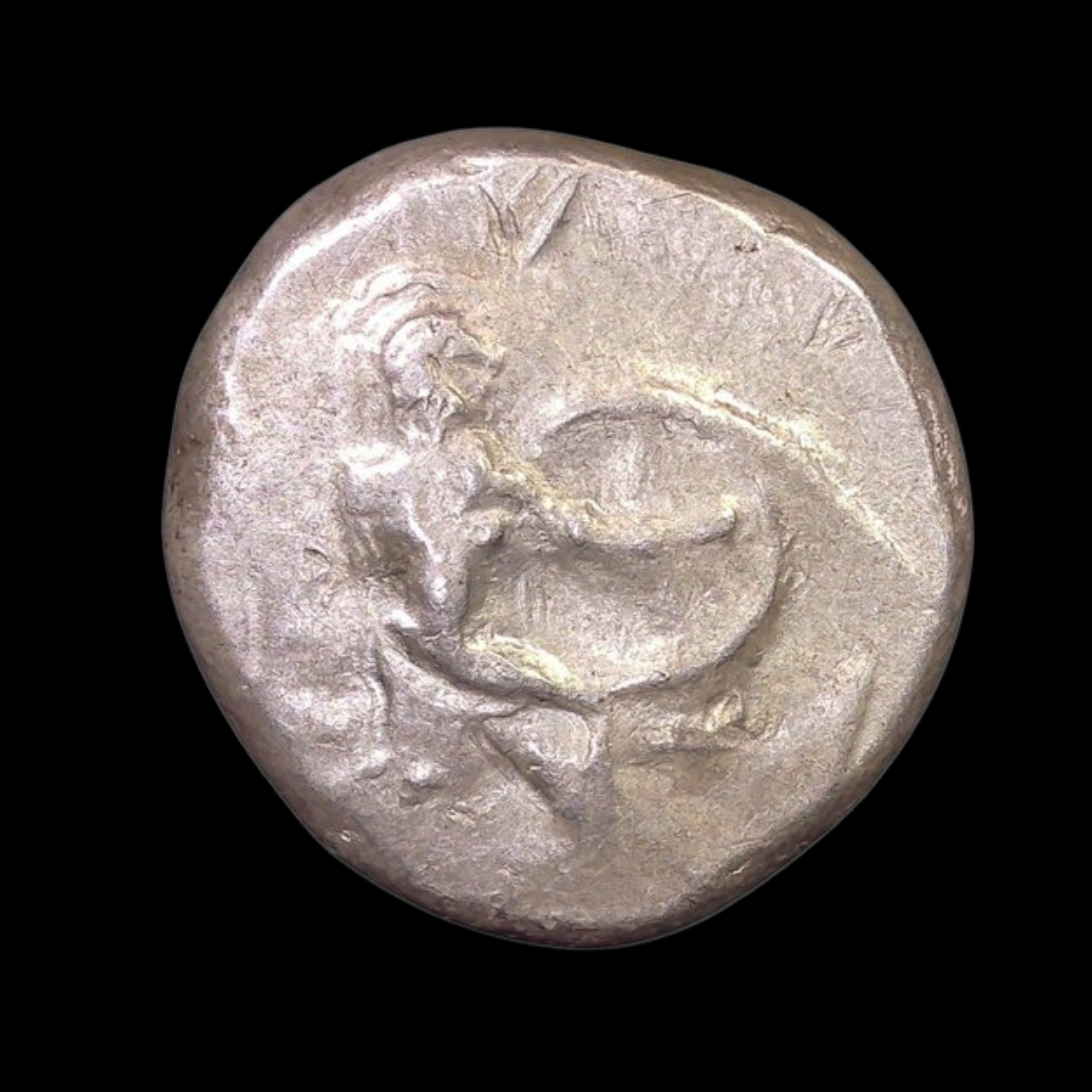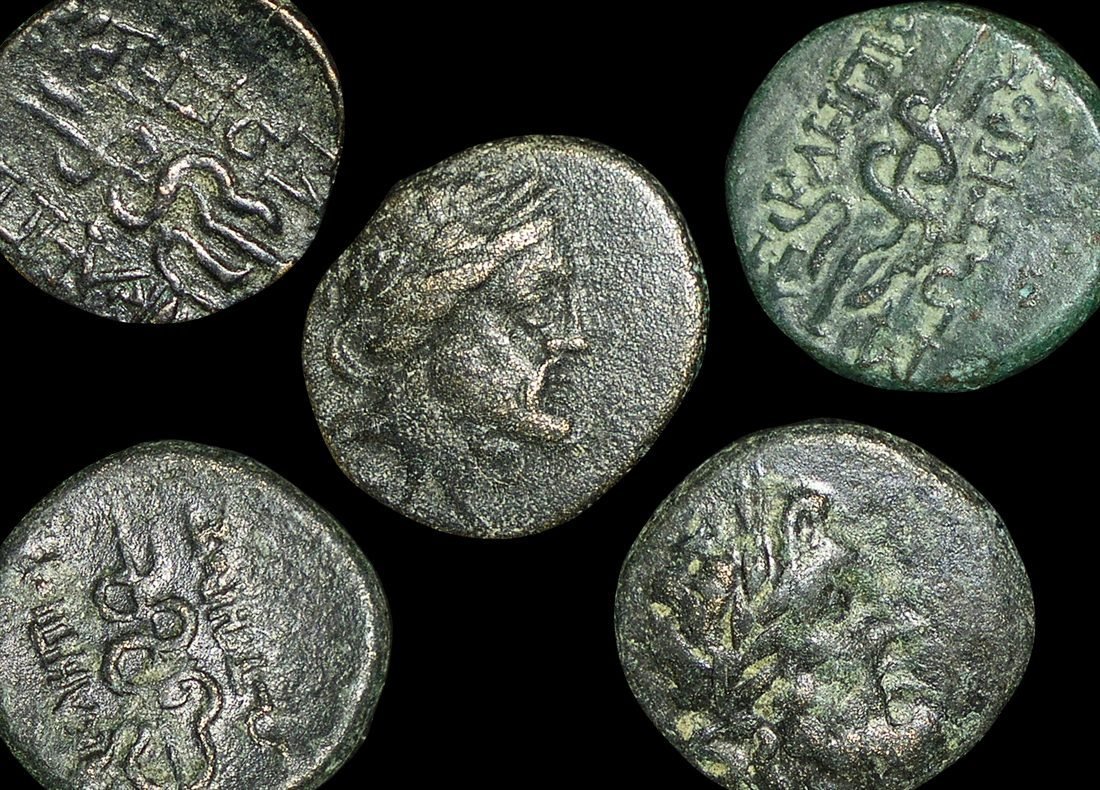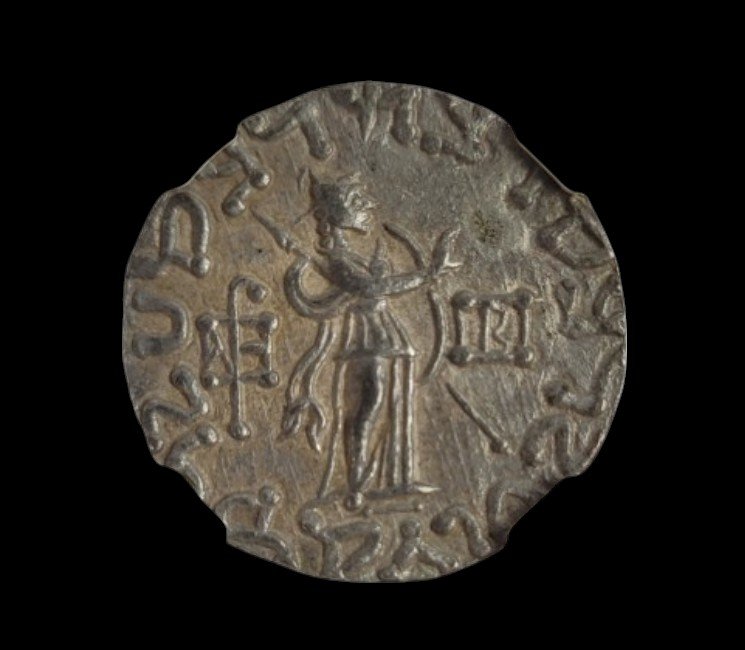 Image 1 of 2
Image 1 of 2

 Image 2 of 2
Image 2 of 2



Silver Coin of King Demetrios Poliorketes (about 2,315 years old)
This impressive silver coin is a tetradrachm issued under King Demetrios I "Poliorketes" (meaning "the Besieger") of Macedon around 290-289 BC. Minted in Amphipolis in ancient Macedonia (modern northern Greece), it showcases both the ruler's self-promotion and the exceptional artistic quality of Hellenistic coinage.
Coin Description:
Front side: The portrait of King Demetrios Poliorketes is depicted wearing a crown and horn symbols (bull horns, representing divine power). This realistic portrait style became common after Alexander the Great, as rulers began placing their own images on coins.
Back side: The sea god Poseidon is shown standing with one foot on a rock, proudly holding his trident (three-pronged spear). This imagery connects Demetrios to naval power, which was crucial to his military campaigns.
Technical Details:
Silver composition
Tetradrachm (a large denomination in the Greek monetary system)
Weight: 17.16 grams
Size: approximately 30mm across
Minted in Amphipolis
Struck around 290-289 BC
Condition not specified
Historical Significance: This coin was produced during the tumultuous period following Alexander the Great's death in 323 BC, when his empire fractured into territories controlled by his generals (the "Diadochi" or Successors). Demetrios Poliorketes, son of Antigonus I Monophthalmus, became known for his siege engineering skills (hence his nickname "the Besieger") and his naval victories. The coin was minted during a time when Demetrios had gained control of Macedonia, though his reign would be relatively short-lived. The Poseidon imagery directly references Demetrios' naval power, which was instrumental in his military campaigns. Tetradrachms like this one were high-value coins used mainly for large transactions, trade, and payment to soldiers, making them important tools for both commerce and propaganda. The artistic quality represents the advanced craftsmanship of Hellenistic period mints, with more naturalistic portraiture than earlier Greek coinage.
This impressive silver coin is a tetradrachm issued under King Demetrios I "Poliorketes" (meaning "the Besieger") of Macedon around 290-289 BC. Minted in Amphipolis in ancient Macedonia (modern northern Greece), it showcases both the ruler's self-promotion and the exceptional artistic quality of Hellenistic coinage.
Coin Description:
Front side: The portrait of King Demetrios Poliorketes is depicted wearing a crown and horn symbols (bull horns, representing divine power). This realistic portrait style became common after Alexander the Great, as rulers began placing their own images on coins.
Back side: The sea god Poseidon is shown standing with one foot on a rock, proudly holding his trident (three-pronged spear). This imagery connects Demetrios to naval power, which was crucial to his military campaigns.
Technical Details:
Silver composition
Tetradrachm (a large denomination in the Greek monetary system)
Weight: 17.16 grams
Size: approximately 30mm across
Minted in Amphipolis
Struck around 290-289 BC
Condition not specified
Historical Significance: This coin was produced during the tumultuous period following Alexander the Great's death in 323 BC, when his empire fractured into territories controlled by his generals (the "Diadochi" or Successors). Demetrios Poliorketes, son of Antigonus I Monophthalmus, became known for his siege engineering skills (hence his nickname "the Besieger") and his naval victories. The coin was minted during a time when Demetrios had gained control of Macedonia, though his reign would be relatively short-lived. The Poseidon imagery directly references Demetrios' naval power, which was instrumental in his military campaigns. Tetradrachms like this one were high-value coins used mainly for large transactions, trade, and payment to soldiers, making them important tools for both commerce and propaganda. The artistic quality represents the advanced craftsmanship of Hellenistic period mints, with more naturalistic portraiture than earlier Greek coinage.
This impressive silver coin is a tetradrachm issued under King Demetrios I "Poliorketes" (meaning "the Besieger") of Macedon around 290-289 BC. Minted in Amphipolis in ancient Macedonia (modern northern Greece), it showcases both the ruler's self-promotion and the exceptional artistic quality of Hellenistic coinage.
Coin Description:
Front side: The portrait of King Demetrios Poliorketes is depicted wearing a crown and horn symbols (bull horns, representing divine power). This realistic portrait style became common after Alexander the Great, as rulers began placing their own images on coins.
Back side: The sea god Poseidon is shown standing with one foot on a rock, proudly holding his trident (three-pronged spear). This imagery connects Demetrios to naval power, which was crucial to his military campaigns.
Technical Details:
Silver composition
Tetradrachm (a large denomination in the Greek monetary system)
Weight: 17.16 grams
Size: approximately 30mm across
Minted in Amphipolis
Struck around 290-289 BC
Condition not specified
Historical Significance: This coin was produced during the tumultuous period following Alexander the Great's death in 323 BC, when his empire fractured into territories controlled by his generals (the "Diadochi" or Successors). Demetrios Poliorketes, son of Antigonus I Monophthalmus, became known for his siege engineering skills (hence his nickname "the Besieger") and his naval victories. The coin was minted during a time when Demetrios had gained control of Macedonia, though his reign would be relatively short-lived. The Poseidon imagery directly references Demetrios' naval power, which was instrumental in his military campaigns. Tetradrachms like this one were high-value coins used mainly for large transactions, trade, and payment to soldiers, making them important tools for both commerce and propaganda. The artistic quality represents the advanced craftsmanship of Hellenistic period mints, with more naturalistic portraiture than earlier Greek coinage.
Demetrius I Poliorcetes (/dɪˈmiːtriəs pɒliɔːrˈsiːtiːz/; Greek: Δημήτριος Πολιορκητής, Dēmḗtrios Poliorkētḗs, lit. 'the Besieger of Cities'; 337 – 283 BC) was a Macedonian Greek nobleman and military leader who became king of Asia between 306 – 301 BC and king of Macedon between 294–288 BC. A member of the Antigonid dynasty, he was the son of its founder, Antigonus I Monophthalmus and his wife Stratonice, as well as the first member of the family to rule Macedon in Hellenistic Greece.
In 307 BC, Demetrius successfully ousted Cassander's governor of Athens and after defeating Ptolemy I at the Battle of Salamis (306 BC) he gave his father the title of basileus ("king") over a land spanning from the Aegean Sea to the Middle East. He acquired the title Poliorcetes ("the besieger") after the unsuccessful siege of Rhodes in 305. While Antigonus I and Demetrius planned a revival of the Hellenic League with themselves as dual hegemons, a coalition of the diadochi; Cassander, Seleucus I, Ptolemy I, and Lysimachus defeated the two at the Battle of Ipsus in 301 BC, in which Antigonus I was killed and the Asian territory of his empire was lost. In 294, Demetrius managed to successfully seize control of Athens and establish himself as king of Macedon. He ruled until 288 when he was eventually driven out by Pyrrhus and Lysimachus and later surrendered to Seleucus I in Cilicia, dying there in 283.[1] After a long period of instability, Demetrius' son, Antigonus II Gonatas, managed to solidify the dynasty in the kingdom and establish its hegemony over much of Hellenistic Greece.[2]
Demetrius was particularly involved in innovations in poliorcetics, and although not all of his sieges were successful—such as the siege of Rhodes—he left his mark on the history of global siege warfare.[3] This was notably through the extensive use of siege engines, the establishment of effective logistical procedures to support sieges on a much larger scale than previously, the widespread use of amphibious warfare and finally the very quick pace of execution of his sieges.[3] Demetrius also used his skills as a military architect to fortify cities with defensive architectural innovations, such as, notably, Athens, Sicyon or Corinth.[3] He can be considered one of the main Epigoni, the heirs of the Diadochi.
You Might Also Like











